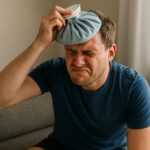Share this post
Blue Monday: The Reality Behind the “Most Depressing Day of the Year”
Every year, the third Monday of January is labeled as “Blue Monday,” a day supposedly marked by a surge in mental health-related urgent care visits. Many believe this spike occurs due to post-holiday blues, financial stress, failed New Year’s resolutions, and cold winter weather. But is this really the most depressing day of the year, or just a myth wrapped in marketing?
According to Dr. Jason Pirozzolo, a leading expert in sports medicine and mental well-being, the truth behind Blue Monday is more nuanced than a simple date on the calendar. “There is no scientific evidence that one specific Monday in January consistently sees the highest number of mental health-related visits. However, there are clear patterns that show seasonal mental health struggles do peak in January and February,” he explains.
Why Does Mental Health Decline in January?
The start of the new year is often portrayed as a time of fresh beginnings and motivation. However, for many people, it can be one of the most mentally exhausting periods of the year. Several key factors contribute to this:
- Post-Holiday Blues – The festive season is filled with celebrations, social gatherings, and excitement. Once it’s over, the sudden drop in stimulation and return to routine can leave people feeling empty and unmotivated.
- Failed New Year’s Resolutions – Many set ambitious goals in January, only to fall short within weeks. This failure can trigger feelings of guilt, disappointment, and self-doubt.
- Seasonal Affective Disorder (SAD) – The lack of sunlight and shorter days affect serotonin and melatonin levels, leading to depression, fatigue, and difficulty sleeping.
- Financial Stress – Holiday spending often results in high credit card bills in January, creating added financial anxiety.
- Workplace Pressure – Many return to demanding workloads, feeling overwhelmed after a holiday break.
These combined factors can create the illusion of a single worst day, but mental health struggles typically build over weeks or months rather than peaking on one specific Monday.
Is Blue Monday the Busiest Day for Mental Health Visits?
Urgent care centers do report an increase in mental health-related visits during January and February, but the third Monday of January is not consistently the busiest day of the year. Instead, spikes in urgent care visits for mental health issues often follow:
- Major financial stressors (such as the first paycheck after the holidays).
- Severe weather changes, especially in regions with extreme cold.
- National events or news cycles that impact mental well-being.
“We do see an increase in anxiety and depression cases after the holidays, but there’s no hard data proving that one Monday in January is always the worst,” says Dr. Jason Pirozzolo. “Mental health doesn’t work like clockwork—it’s influenced by individual and environmental factors over time.”
Recognizing the Signs of Mental Health Struggles
Regardless of whether Blue Monday is real, the fact remains that millions struggle with their mental health during the winter months. Recognizing the warning signs early is critical for seeking help. Some common symptoms of depression and anxiety include:
- Persistent sadness, irritability, or hopelessness
- Fatigue and low energy despite adequate sleep
- Loss of interest in activities once enjoyed
- Changes in appetite and sleep patterns
- Difficulty concentrating or making decisions
- Increased reliance on alcohol or other substances
- Physical symptoms like headaches or muscle pain without clear cause
If you notice these symptoms in yourself or a loved one, seeking help sooner rather than later is essential.
How to Protect Your Mental Health in Winter
Even though Blue Monday not be scientifically real, the seasonal mental health struggles people face are very real. Dr. Jason Pirozzolo recommends several effective strategies to manage mental health during the winter months:
1. Maximize Exposure to Natural Light
Shorter days mean less sunlight, which can negatively impact mood-regulating hormones. Try to:
- Spend at least 30 minutes outdoors daily, even in cold weather.
- Use a light therapy lamp in the morning if natural light is limited.
- Keep curtains open to let as much daylight in as possible.
2. Stay Physically Active
Exercise boosts endorphins and serotonin, improving mood and reducing anxiety. Even small activities help:
- Take a walk during daylight hours.
- Try indoor workouts like yoga or resistance training.
- Consider group activities like dance or fitness classes for social engagement.
3. Focus on Nutrition
What you eat directly affects brain function and mood stability. Aim for:
- Omega-3-rich foods like salmon, walnuts, and flaxseeds.
- Complex carbs (quinoa, whole grains) to maintain energy levels.
- Magnesium-rich foods (leafy greens, nuts) to support stress reduction.
4. Set Realistic Goals
Avoid falling into the New Year’s resolution trap by:
- Setting small, achievable goals instead of extreme changes.
- Celebrating small progress rather than focusing on setbacks.
- Practicing self-compassion instead of harsh self-criticism.
5. Prioritize Social Connections
Isolation can worsen depression and anxiety. Stay connected by:
- Scheduling regular meet-ups with friends or family.
- Engaging in virtual communities or hobbies if in-person interaction isn’t possible.
- Seeking support groups for mental health discussions.
6. Seek Professional Help When Needed
If symptoms persist or worsen, it’s important to consult a doctor, therapist, or counselor. “Mental health is just as important as physical health, and seeking help should never be seen as weakness,” says Dr. Jason Pirozzolo.
Final Thoughts: Don’t Wait for “Blue Monday” to Prioritize Mental Health
While Blue Monday may not be an official medical phenomenon, the mental health struggles people experience in January are real. Instead of waiting for one specific day to address mental health concerns, take proactive steps year-round.
For more insights into injury prevention, trauma care, and advancements in modern medicine, follow Dr. Jason Pirozzolo. His expertise can help you navigate the path to better health and recovery. You may also contact a Key West orthopedic clinic for more information.




















